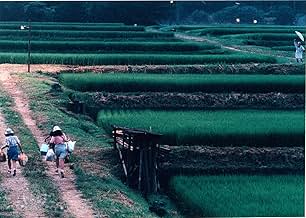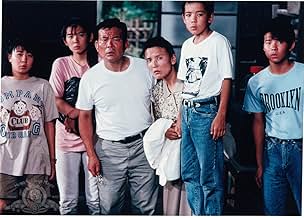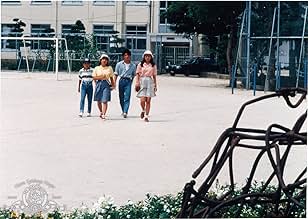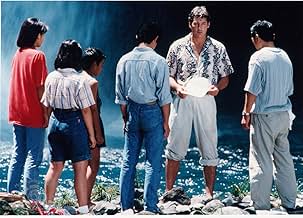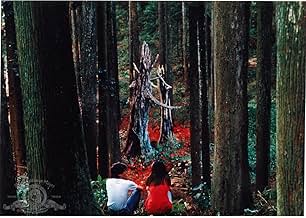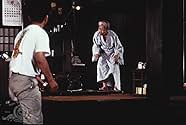CALIFICACIÓN DE IMDb
7.2/10
8 k
TU CALIFICACIÓN
Entre sonrisas y lágrimas, la abuela recuerda la historia de su familia y de la sociedad japonesa de su tiempo, tratando de llegar a comprender mejor el pasado y el presente.Entre sonrisas y lágrimas, la abuela recuerda la historia de su familia y de la sociedad japonesa de su tiempo, tratando de llegar a comprender mejor el pasado y el presente.Entre sonrisas y lágrimas, la abuela recuerda la historia de su familia y de la sociedad japonesa de su tiempo, tratando de llegar a comprender mejor el pasado y el presente.
- Dirección
- Guionistas
- Elenco
- Premios
- 5 premios ganados y 7 nominaciones en total
Richard Gere
- Clark
- (as Richâdo Gia)
Mieko Suzuki
- Minako
- (as Mie Suzuki)
- Dirección
- Guionistas
- Todo el elenco y el equipo
- Producción, taquilla y más en IMDbPro
Opiniones destacadas
I got really bore at first time when I saw this movie in theatre in 1992. Since I know Kurosawa is a perfectionist and usually try to say something important in his movie, I am sure there are some hidden message in his story other than the obvious. After twenty years, I decided to rent the out the DVD to examine the movie in detail. I was not disappointed and the true theme revealed to me immediately and I love it even the 3rd and 4th time. It was not just about the H-bomb incidence. It was a way for Kurosawa to tell the how young Japanese generation abandoned their own tradition culture and it is the American, once the enemy of Japan, are reviving it for the country. His second major theme was about old people who seen to be weak, senile and out of time, but when circumstance arise, they could still release plenty of energy to protect their youngs like how he still could such powerful movie like Rhphsody in August. I believe Kurosawa did this movie strictly for his fans to enjoy because unless you understand his thought, this movie is extremely boring at the surface, look as if it is produced by an old man out of touch with his time.
Although aware of Akira Kurosawa's standing in the realm of world cinema,I have never been a great fanatic of his films as most of them are Samurai films heavily laden with symbolic references to Japanese society.For me Akira Kurosawa's non Samurai films are better films as they speak of deeper issues like human sentiments.I watched "Rhapsody in August" directed by Akira Kurosawa film with rapt attention.As I was watching it after having watched "Madadayo",I could not help but comparing it both in style as well as content with that film.Both the films were made by Kurosawa when he was at the end of his career and may be for this reason he chose to make humanist stories.Rhapsody in August is a meaningful tale for all people whether they are young or old,American or Japanese.It is a film which shows how important a family is and how wisdom must be passed from the old to the young. Kurosawa has deftly tackled the question of Japan's Atomic bomb tragedy through plain words spoken by an old lady who tells her young grandchildren that with the passage of time all wounds are healed.Rhapsody in August tells us albeit in a non academic manner why it is important to live peacefully thereby avoiding war for the benefit of peaceful coexistence and human society.
Akira Kurosawa is one of my very favorite filmmakers. If you search through my reviews, I have written about a few, The Seven Samurai, High and Low, Kagemusha, and Dreams. I have seen many more, Rashomon, Ikiru (my personal favorite), Yojimbo, Sanjuro, Dersu Uzala, and Ran. I have only disliked one, High and Low, but not one of his films failed to amaze me in some way or other. My initial opinion, after seeing Rashomon, The Seven Samurai, Yojimbo, Ran and Kagemusha was that he was an amazing stylist whose films felt slightly impersonal to me. I strongly disagree with that opinion now (I expressed it in my review to Kagemusha, which I'm surprised hasn't resulted in tons of hate mail).
I have just finished watching Kurosawa's second to last film, Rhapsody in August. It is not highly regarded, usually dismissed as a very minor work in a master's portfolio. This I also discovered about my second favorite of his films, Dreams. Well, as far as my opinion, I think people were dead wrong about both of these films.
Rhapsody in August is not a stylistic masterpiece like The Seven Samurai, Yojimbo, or Ran. Instead, only second to Ikiru, it is Kurosawa's most humanistic film. I have only seen one film by him (although I've read a lot about him), but I would compare it more to Yasujiro Ozu's work.
This film has a plethora of themes, ranging from the effect of the H-Bomb on both the Japanese and the Americans, the generation gaps between the three generations present (the matriarch of the family feels separate from her middle-aged children, but she relates well to her grandchildren who are interested in their country's sorrowful history), and the effect of American culture on the Japanese of the present generation. It is quite a handful, but everything is handled so subtly that some viewers who don't pick up on it all may easily grow uninterested. In some ways, the film feels very didactic (in a good way). I can imagine this film being showed to younger children, since the four grandchildren, at least at the beginning, are learning about the history of the bomb and Nagazaki and their grandfather's death.
The only weak point of the film is probably the very end, which is difficult to understand. I have a feeling that there was some cross-cultural barrier preventing my understanding of it, so if anyone does get it, please contact me. Anyway, as I perceived it, the film ended kind of randomly. But still, what has come before is too good to get too upset by the lack of closure. It deserves a 10/10.
I have just finished watching Kurosawa's second to last film, Rhapsody in August. It is not highly regarded, usually dismissed as a very minor work in a master's portfolio. This I also discovered about my second favorite of his films, Dreams. Well, as far as my opinion, I think people were dead wrong about both of these films.
Rhapsody in August is not a stylistic masterpiece like The Seven Samurai, Yojimbo, or Ran. Instead, only second to Ikiru, it is Kurosawa's most humanistic film. I have only seen one film by him (although I've read a lot about him), but I would compare it more to Yasujiro Ozu's work.
This film has a plethora of themes, ranging from the effect of the H-Bomb on both the Japanese and the Americans, the generation gaps between the three generations present (the matriarch of the family feels separate from her middle-aged children, but she relates well to her grandchildren who are interested in their country's sorrowful history), and the effect of American culture on the Japanese of the present generation. It is quite a handful, but everything is handled so subtly that some viewers who don't pick up on it all may easily grow uninterested. In some ways, the film feels very didactic (in a good way). I can imagine this film being showed to younger children, since the four grandchildren, at least at the beginning, are learning about the history of the bomb and Nagazaki and their grandfather's death.
The only weak point of the film is probably the very end, which is difficult to understand. I have a feeling that there was some cross-cultural barrier preventing my understanding of it, so if anyone does get it, please contact me. Anyway, as I perceived it, the film ended kind of randomly. But still, what has come before is too good to get too upset by the lack of closure. It deserves a 10/10.
A good movie is interesting and easy to understand. This is an absolute treasure of a film. A love letter to Nagasaki. An opportunity to see how deeply the atom bomb affected Japanese culture. An opportunity to see a number of the landmarks of the attack. And edited so wonderfully. Kurosawa always highly prized being able to tell the the story in images alone and understood how composition of shots increases content, and this movie has some very quiet sober shots that hit really really hard. It shows how we can fail to see things that are right under our noses for years and years. How things can happen that you never get over. I loved this movie!!!
A beautiful, beautiful film. If you only know Kurosawa through Seven Samurai then this will come as something of a shock. Gentle, sensitive, moving and uplifting. The cinematography is sumptuous with plenty of touches that let you know that this is no ordinary film maker. By far the best of his later films in my opinion.
Don't be confused by the 'starring Richard Gere' tag. He only has a minor part, though he takes it well.
Just go and see it!
Don't be confused by the 'starring Richard Gere' tag. He only has a minor part, though he takes it well.
Just go and see it!
¿Sabías que…?
- TriviaAt the top of his career from starring alongside Julia Roberts in Mujer bonita (1990), Richard Gere was earning millions of dollars per picture. Akira Kurosawa's company felt they were unable to pay his salary, to which Gere responded with "I'll work free for Kurosawa." Not wanting to take advantage of the actor, they offered him a modest sum, as well as offering to pay for all his travel expenses, including friends he wanted to bring with him to Japan while he worked. One of those friends included Cindy Crawford.
- Bandas sonorasNobara (Heidenröslein)
Lyrics by Johann Wolfgang von Goethe (uncredited)
Music by Franz Schubert (as Shûberuto)
Performed by Hibari Jidou Gasshoudan (Hidetaka Yoshioka, Tomoko Ôtakara, Mieko Suzuki and Mitsunori Isaki)
Selecciones populares
Inicia sesión para calificar y agrega a la lista de videos para obtener recomendaciones personalizadas
- How long is Rhapsody in August?Con tecnología de Alexa
Detalles
Taquilla
- Total en EE. UU. y Canadá
- USD 516,431
- Fin de semana de estreno en EE. UU. y Canadá
- USD 26,771
- 22 dic 1991
- Total a nivel mundial
- USD 517,538
- Tiempo de ejecución
- 1h 38min(98 min)
- Color
- Relación de aspecto
- 1.85 : 1
Contribuir a esta página
Sugiere una edición o agrega el contenido que falta


